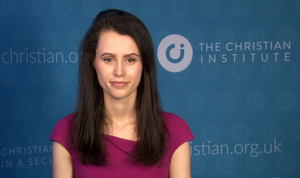High-profile disability campaigner Heidi Crowter is set to go to court to challenge the law on abortion as it relates to Down’s syndrome.
A hearing is due to begin on 6 July examining the law which allows abortion up to birth for babies with Down’s and other disabilities.
Crowter, aged 25, and her fellow campaigners say the law is discriminatory. If the court decides in their favour, it would be a landmark ruling.
Crowter, who has Down’s, has raised more than £80,000 for the case. She is bringing the legal action together with Máire Lea-Wilson, whose 23-month-old son Aidan also has the syndrome.
Lea-Wilson has spoken of how she was placed under pressure to have an abortion when a 34-week scan revealed her son had the condition.
Currently in England, Wales,, and Scotland, abortions may only be performed up to 24 weeks of pregnancy.
But if the baby has a disability – which may include Down’s syndrome, cleft lip or club foot – an abortion is allowed right up to the point of birth.
According to official data from the Department of Health, there were 3,183 disability-selective abortions across England and Wales in 2019, with 656 of those occurring following a prenatal diagnosis of Down’s syndrome.
The UN Committee on the Rights of Persons with Disabilities has consistently criticised countries that provide for abortion on the basis of disability.
Crowter said, ‘The law says that babies shouldn’t be aborted up to birth, but if a baby is found to have Down’s syndrome, it can be aborted up until birth. This is the current law in the UK and I think it’s not fair.
‘The United Nations Committee on the Rights of Persons with Disabilities recently said the UK should change its abortion law to make sure people like me aren’t singled out because of our disabilities but the government hasn’t changed the law.’






















